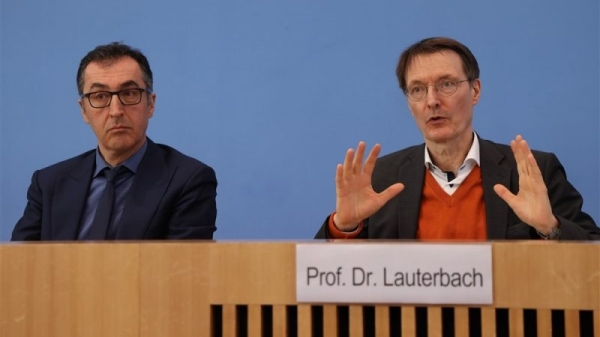Germany wants EU cannabis law changes, waters down own legalisation plans

The German government has decided to lobby Brussels to change EU laws on cannabis and will rework its plans to legalise the drug after the European Commission rejected an initial legislative draft.
The promise to decriminalise the sale and consumption of recreational cannabis was perhaps one of the most high-profile promises in the agreement between the three coalition parties following the last election.
However, after Health Minister Karl Lauterbach presented the first key points for the project in October, it became clear that the initial plan needed to be revised with EU and international law.
After the Commission ‘rejected’ the initial key points during talks in November, as Lauterbach put it, the minister from the Social Democratic Party (SPD), together with agriculture and food minister Cem Özdemir (Greens), have now presented a set of revised plans.
The initial key points “had to be further developed after the talks with the EU Commission and with a view to the international and EU legal framework, so as not to run headlong into the wall,” Özdemir explained at a press conference on Wednesday (12 April).
The plans are now “within the limits of Community law”, although its limits have been “fully exhausted”, the Green minister stressed.
Nevertheless, the government’s key points have been significantly trimmed down compared to those presented in October.
For example, the initial plan to legalise the sale and distribution of cannabis has been dropped to only focus on small-scale cultivation for personal use.
‘Cannabis-Clubs’
Moreover, the new plans also foresee “controlled distribution by non-profit associations for personal consumption”, Lauterbach explained.
Such ‘cannabis clubs’ should be allowed to dispense up to 50 grams of cannabis per month to individuals. For persons below the age of 21, there will also be a monthly limit of 30 grams, while minors will continue to be forbidden to consume cannabis.
The health minister wants to present a corresponding bill before the end of April. The proposal is designed to not require the approval of the federal regions or a so-called notification of the European Commission, Özdemir explained.
This is only possible because such a law would only apply to the private use of cannabis that is regulated at the national level, while EU laws regulate the sale and distribution in a 2004 Council decision.
According to a Commission spokeswoman, the EU law set minimum provisions to ensure that all the activities related to the trafficking of cannabis – which includes production, manufacture, extraction, preparation, offering, offering for sale, distribution, sale, and delivery – are punishable.
Penalties for these activities are left for individual member states to address, as well as the case of personal use of drugs, the spokeswoman continued.

Germany sets out plans for cannabis legalisation amid EU law worries
German health minister Karl Lauterbach presented plans for legalising cannabis for recreational use – a key promise of the country’s “traffic light” government, although the project could still be halted by the EU Commission.
EU-wide liberalisation?
In the longer term, the government also intends to push for legal relaxation at the EU level, including the decriminalisation of commercial activities.
The government wants to “become politically active in Brussels as the Federal Republic of Germany, together with states that have a similar view of the previous cannabis policy in Brussels”, Özdemir explained.
According to his government, the previous restrictive approach in German and EU cannabis policy has not achieved its intended goal.
For example, while the number of violations of the Narcotics Act is high and steadily increasing, impurities and toxic admixtures in substances acquired on the black market pose a serious danger, Lauterbach stressed.
Legalisation, on the other hand, would help suppress black market trade and better protect children and young people in particular, he added.
Model trials
Lauterbach also expressed optimism that support could be found among member states to amend the bloc’s legal framework on the matter but did not want to specify which countries had so far shown themselves open to the idea in confidential talks.
Neighbouring France, for example, had recently shown little enthusiasm about Germany’s legalisation plans.
To make its case in Brussels, the government will provide regional model trials in which the commercial distribution of cannabis will be tested over five years and scientifically monitored – details of which will be presented after the summer break.
According to Özdemir and Lauterbach, the key points presented on Wednesday are also supported by FDP Justice Minister Marco Buschmann, who was on leave and thus unable to attend the presentation.
While the project of cannabis legalisation is popular, especially among young Germans, harsh criticism comes from the opposition.
The conservative CDU, particularly its Bavarian sister party CSU, have slammed the plans as harmful to public health and non-compatible with EU law.

France to keep a cautious watch on German cannabis bill
As Germany moves towards the legalisation of recreational cannabis in 2024, the French government intends to keep a close eye on developments in its European neighbour’s legislative framework.



